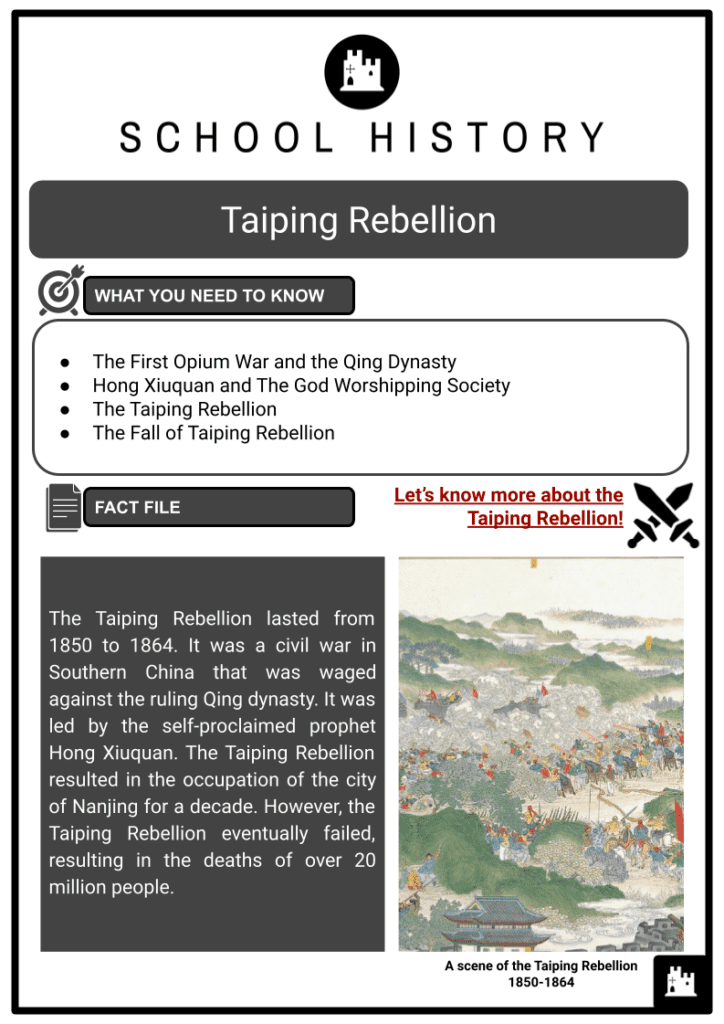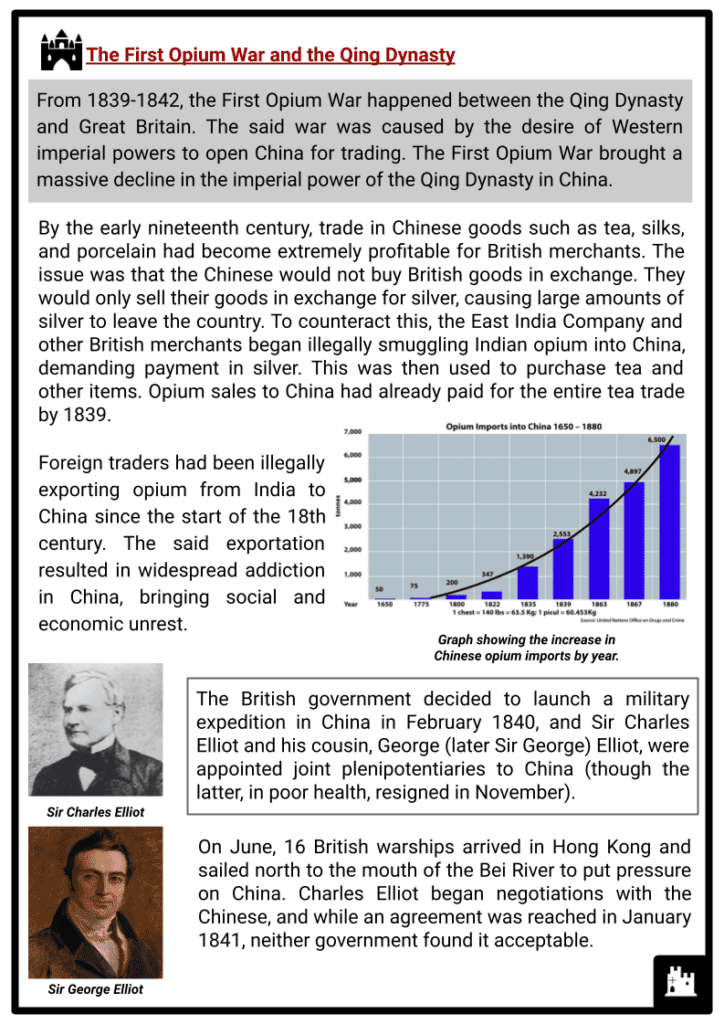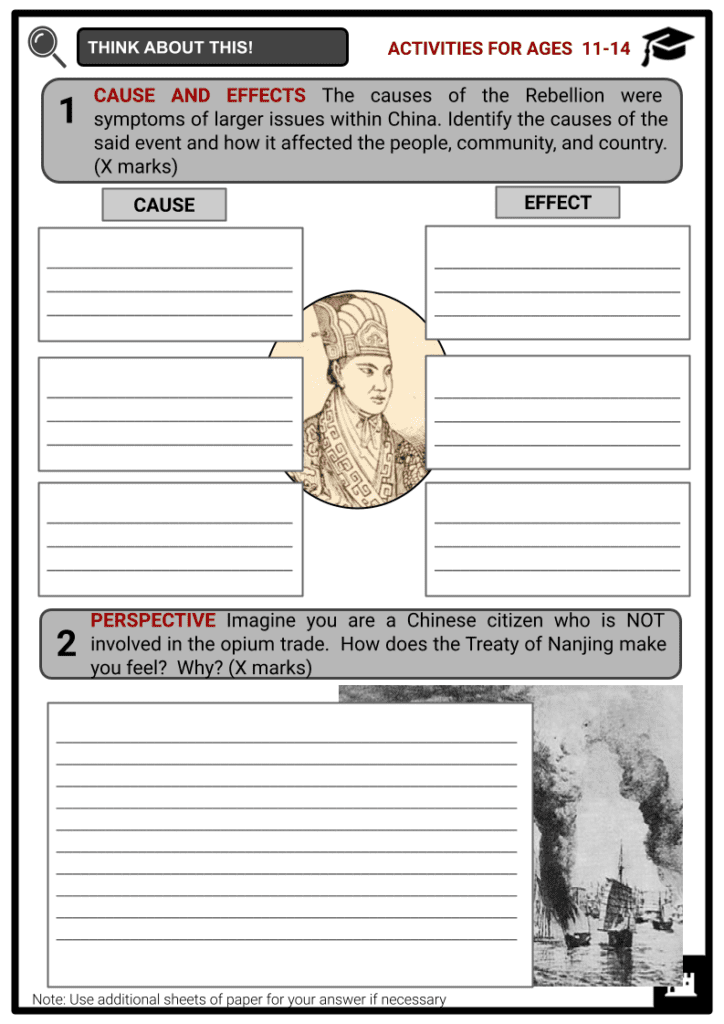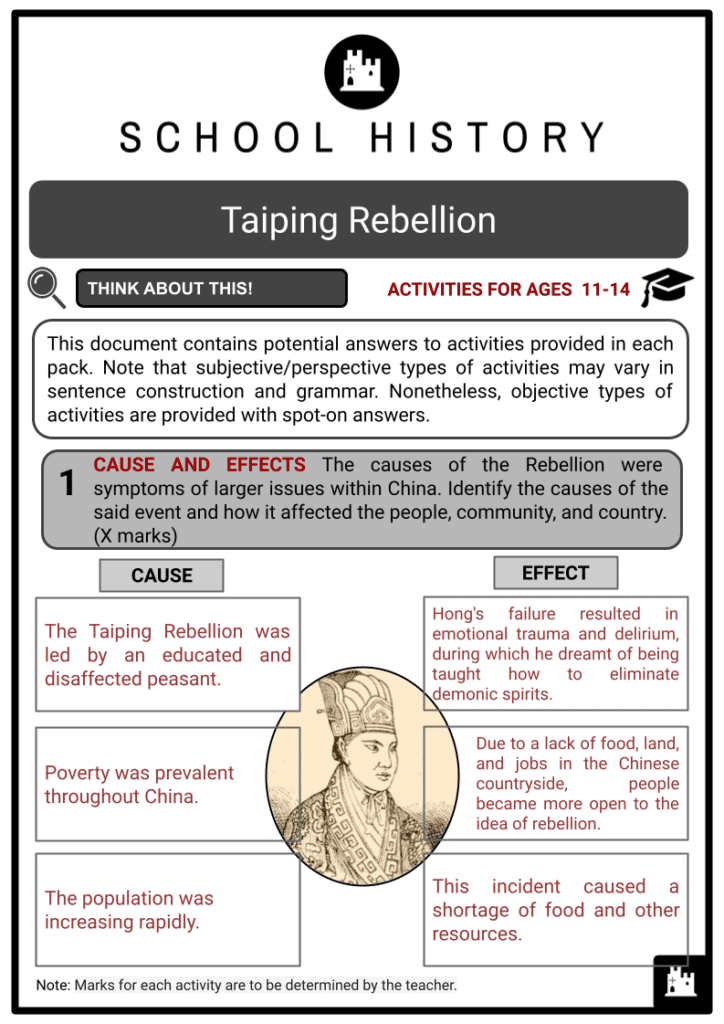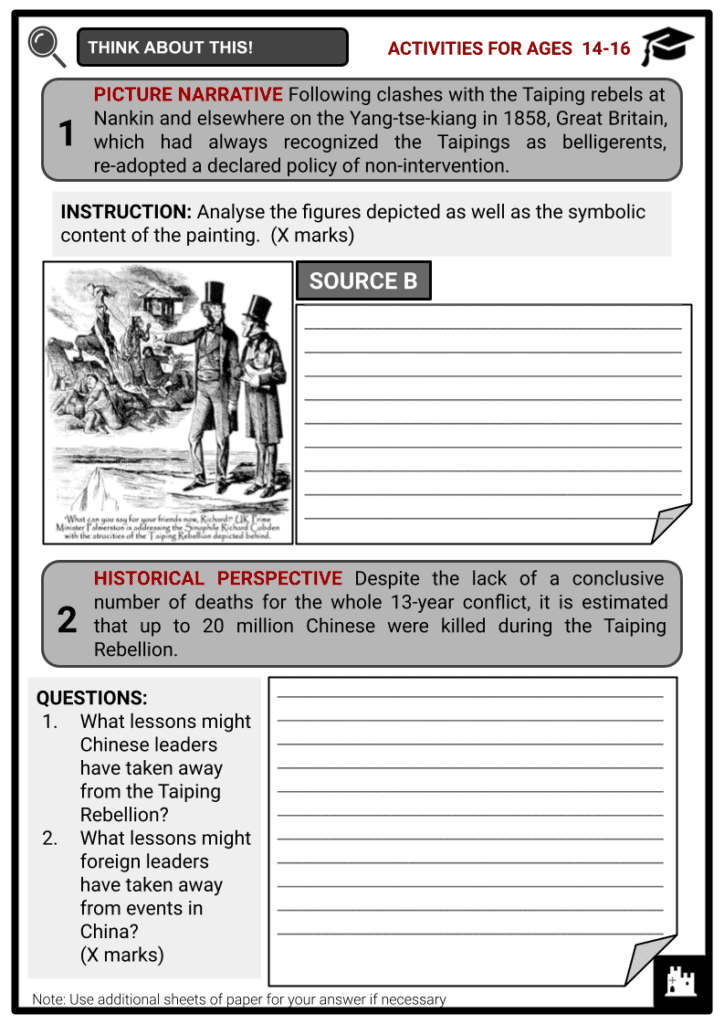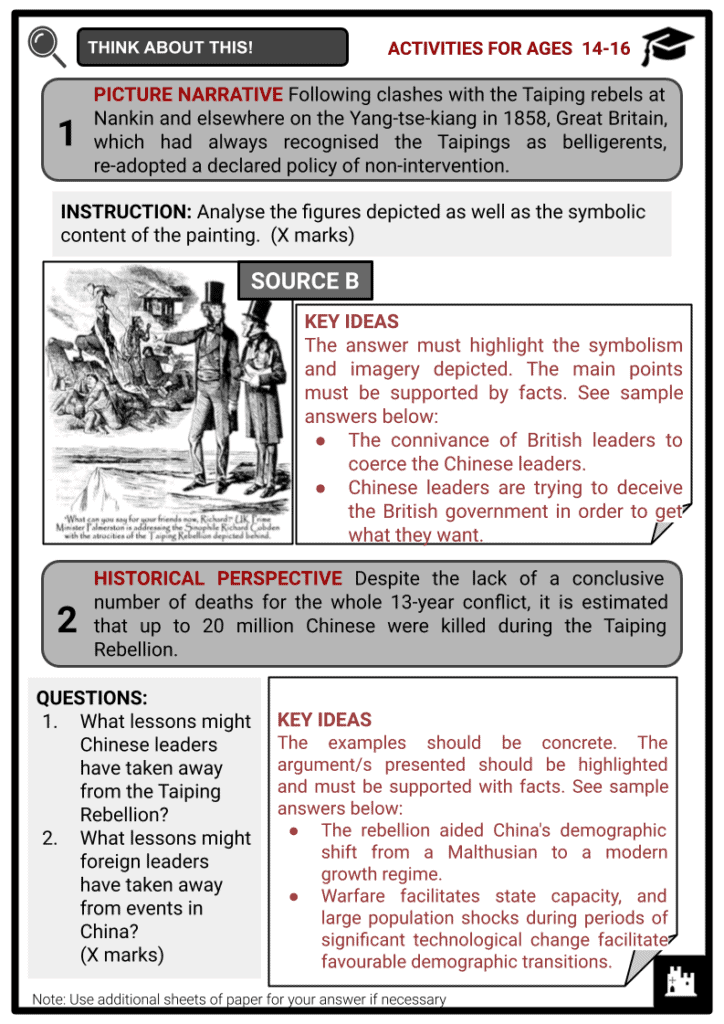Taiping Rebellion Worksheets
Do you want to save dozens of hours in time? Get your evenings and weekends back? Be able to teach about the Taiping Rebellion to your students?
Our worksheet bundle includes a fact file and printable worksheets and student activities. Perfect for both the classroom and homeschooling!
Summary
- The First Opium War and the Qing Dynasty
- Hong Xiuquan and The God Worshipping Society
- The Taiping Rebellion
- The Fall of Taiping Rebellion
Key Facts And Information
Let’s find out more about the Taiping Rebellion!
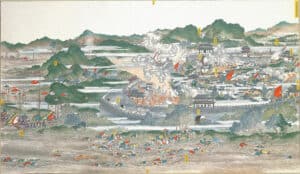
The Taiping Rebellion lasted from 1850 to 1864. It was a civil war in Southern China that was waged against the ruling Qing dynasty. It was led by the self-proclaimed prophet Hong Xiuquan. The Taiping Rebellion resulted in the occupation of the city of Nanjing for a decade. However, the Taiping Rebellion eventually failed, resulting in the deaths of over 20 million people.
The First Opium War and the Qing Dynasty
- From 1839-1842, the First Opium War happened between the Qing Dynasty and Great Britain. The said war was caused by the desire of Western imperial powers to open China for trading. The First Opium War brought a massive decline in the imperial power of the Qing Dynasty in China.
- By the early nineteenth century, trade in Chinese goods such as tea, silks, and porcelain had become extremely profitable for British merchants. The issue was that the Chinese would not buy British goods in exchange. They would only sell their goods in exchange for silver, causing large amounts of silver to leave the country. To counteract this, the East India Company and other British merchants began illegally smuggling Indian opium into China, demanding payment in silver. This was then used to purchase tea and other items. Opium sales to China had already paid for the entire tea trade by 1839.
- Foreign traders had been illegally exporting opium from India to China since the start of the 18th century. The said exportation resulted in widespread addiction in China, bringing social and economic unrest.
- The British government decided to launch a military expedition in China in February 1840, and Sir Charles Elliot and his cousin, George (later Sir George) Elliot, were appointed joint plenipotentiaries to China (though the latter, in poor health, resigned in November).
- On June, 16 British warships arrived in Hong Kong and sailed north to the mouth of the Bei River to put pressure on China. Charles Elliot began negotiations with the Chinese, and while an agreement was reached in January 1841, neither government found it acceptable.
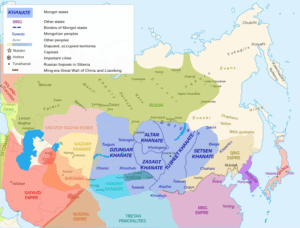
Maps showing the expansion of the Qing Dynasty from 1636 - In 1839, around 1,400 tons of opium from British merchants' storage facilities at Canton (Guangzhou) were seized and destroyed by the Chinese authorities. The war ended because of internal conflict, social unrest ushering in the doubt and non-acceptance of the subjects towards the Qing dynasty, and the advancement of British weapons.
- In May 1841, the British attacked the walled city of Guangzhou (Canton) and received a $6 million ransom, prompting a Cantonese counterattack. This marked the start of a long-running conflict between the British and the Cantonese.
The Qing Dynasty
- From 1644 to 1912, the last imperial dynasty of China ruled. It was an era remembered for its initial prosperity and turbulence in its final years, as well as being only the second time that China was not ruled by the Han.
- The Qing army had no effective tactics against the powerful British navy. They simply set burning rafts on the enemy's fleet and encouraged people to take the heads of the enemies in exchange for a prize.
- The British declared that their goal was to fight corrupt government officials and soldiers, not to wage war on the Chinese people.
- Indeed, there was a deep schism between the government and the people that the British could easily exploit, a weakness in Qing society that surfaced during the war's crisis.
- Henry Pottinger, Elliot's successor, arrived in Macau in August and launched a campaign northward, seizing Xiamen (Amoy), Dinghai, and Ningbo. He resumed his campaign in May 1842, with reinforcements from India, and took Wusong, Shanghai, and Zhenjiang. Nanjing surrendered in August, and the Treaty of Nanjing restored peace.
- The Treaty of Nanking, commonly known as the Treaty of Nanjing, was instrumental in ending the First Opium War (1839-1842) between the United Kingdom and China's Qing dynasty on 29 August 1842.
- The treaty is known to be “unequal treaties” between Great Britain and China. This included the payment of reparation for the war by China and to surrender of the territory of Hong Kong.
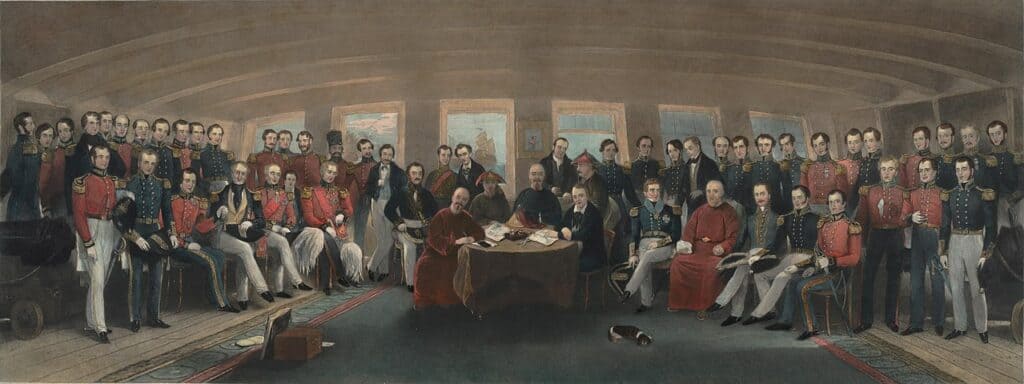
Signing of the Treaty of Nanjing. - The treaty also permitted British merchants to trade at “five treaty ports” which were: Canton (Guangzhou), Amoy (Xiamen), Foochow (Fuzhou), Nigpo (Ningbo), and Shanghai.
- In 1843, the British Supplementary Treaty of Bogueso gave the British the right to extraterritoriality meaning that British citizens received most-favoured-nation status and those who broke the law in China could only be tried in British courts.
Background of the Treaty
- Britain could not match China's increasing imports of Chinese goods, such as tea and porcelain into the country.
- Despite Chinese law prohibiting the importation and sale of opium, it was grown on plantations in British India. Opium was auctioned off to merchants, who then sold it to the Chinese, who smuggled it into China.
Hong Xiuquan and the God Worshipping Society
- Hong Xiuquan was born on 1 January 1814, in Huaxian (now Huadu), Guangdong province in China. He died on 1 June 1864. He was a Chinese religious prophet and leader of the Taiping Rebellion (1850-64), during which he declared his new dynasty.
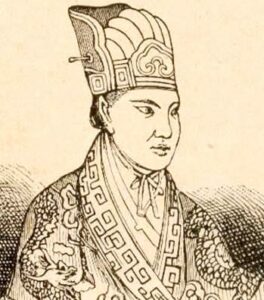
Hong Xiuquan - Hong grew up in a poor but proud Hakka family as the youngest of four children. The Hakkas were hardworking people who had migrated from the north several centuries earlier and had kept their original customs. At a young age, Hong demonstrated great intelligence and his entire village supported him in his studies in the hopes that he might sooner or later pass the Confucian civil examination, join the government bureaucracy, and bring riches and honour to his family and friends. Hong did take the government exam for the first time in 1827 and failed to obtain even the lowest official degree, which was not surprising given the large number of candidates who competed.
Civil Service Examinations
- Competitive examinations were first used to select civil officials in China during the Han dynasty and were later expanded to include all important positions during the Sung dynasty. They provided opportunities for the peasantry to raise their social status by providing a chance to join the bureaucracy, work in the imperial court, or serve the emperor.
Hong’s Conversion to Christianity
- Hong recovered and returned to his job as a village school teacher. For the fourth and final time, he took the examination for the last time in 1843 but failed once again. Soon after, Li Jingfang, Hong's cousin, noticed an unusual work titled Quanshi-liangyan ("Good Words for Exhorting the Age") on Hong's bookshelves.
- The work, written by a Chinese missionary explaining the fundamentals of Christianity, was given to Hong during his visit to Guangzhou in 1837. He realised he had been transported to heaven during his illness. God was the old man he had spoken with, and Jesus Christ was the middle-aged man.
- He grew to believe that the father from his long-ago dream was the God of Christianity, the elder brother was Jesus, and the serpent from the Garden of Eden was the King of Hell.
- Hong was now certain that he was the son of God. According to him, he was the younger brother of Jesus.
- Hong spread his ideas and teachings and soon began to have followers. The majority of Hong’s followers belong to the minority people of Hakka. The Hakka people were traditionally discriminated against by the ethnic majority of the Chinese people. His followers travelled, spread his teachings, and formed a group called BaiShangidi Hui, or the God-Worshipping Society.
- These writings cover a wide range of topics, including treatises like The Ten Heavenly Commandments, economic platforms, as well as social concepts, such as the separation of men and women and the social programme of collective distribution of land and property.
- Hong became obsessed with the idea of leading his followers. So…
- In 1847, he became the leader of the God-Worshipping Society. His number of followers also increased. His followers wanted to help him form an army to fight against the demons.
- Hong began spreading the new doctrine among his friends and family. His schoolmate, Feng Yunshan was one of his most important converts.
- Hong lost his job in 1844 after destroying the Confucius tablets in the village school where he was teaching, and Feng accompanied him on a preaching trip to neighbouring Guangxi province.
- Hong returned from Guangxi after a few months, but Feng stayed and founded the Baishangdi Hui ("God Worshippers' Society"), a religious organisation devoted to Hong's new doctrines.
- Soon, he revealed the demons that he had to fight were the Qing dynasty. The divine interpretation was not only limited to Hong. Other members had claimed divine interpretation.
- In 1848, Hong welcomed Yang Xiuqing, a charcoal burner who claimed to channel God, and Xiao Chaogui, a peasant who claimed he channelled Jesus. In 1849, the God-Worshipping Society expanded its influence.
- With control over the lives of his followers, Hong decreed the separation of men and women. Hong named their new religion Taiping, which means "Great Peace" faith.
- The Taiping eventually formed a full army, formed alliances, recruited families, and united peasants and intellectuals who thought the Qing was weak and the cause of China's decline. Their militia was extremely successful.
The Taiping Rebellion
- The God-Worshipping Society alarms local authorities who desire to suppress the movement's beliefs and arrest a number of its leaders. In 1850, Hong began to arm his followers to “fight for heaven”, this fight meant to go against the Qing dynasty, which he believed to be the demons.
- In 1851, Hong Xiuquan declared the Jintian uprising against the Qing dynasty. This signalled the beginning of the Taiping Rebellion. The Taiping Army was victorious against the Qing army. The year 1851 was proclaimed the first year of “the Taiping Heavenly Kingdom”.
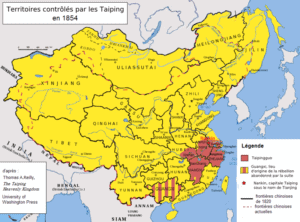
Map of China showing the territories controlled by the Taiping Forces during the Taiping Rebellion. - The city of Yongan was taken over by Hong and his soldiers after they left Thistle Mountain. His army now had 60,000 soldiers. The successful campaign of the religious and political Taiping movement may be attributed to the spread of the message through printed pages. Hong and his fellow leaders published more than 44 books, numerous policy proposals and political and religious tracts.
- The Taiping Forces also promoted monogamy, banned the practice of foot binding, prohibiting opium, prostitution, and gambling.
- In 1852, the Taiping army successfully conquered the City of Nanjing boasting 2 million followers.
- With Hong as the King of Heaven, the administration of the Taiping Army territory was divided among the provincial rulers called kings or princesses.
- The Taiping cause received widespread support. Politically and economically, the movement appealed to the anti-Manchu sentiment as well as to destitute peasants. They quickly occupied a large amount of desirable land, including Nanjing, China's former capital, where they made their capital. According to one Taiping leader:Each year they [the Manchus] transform tens of millions of China’s gold and silver into opium and extract several millions from the fat and marrow of the Chinese people and turn it into rouge and powder. . . . How could the rich not become poor? How could the poor abide by the law?
- Despite its early success, the Taiping Rebellion was dogged by internal strife, a lack of cohesion, autocratic leadership, and extreme religious dogma. Hundreds of thousands were killed in the final battle, the third battle for the city of Nanjing.
The Fall of Taiping Rebellion
- In spite of its success, the Taiping Rebellion eventually suffered from internal conflict, a lack of coherence, dictatorial leadership, and extreme religious ideology.
- In 1853, with the failed attempt to capture Beijing, Hong chose to halt the conquest and focused on establishing the administration in Nanjing. The Taiping Army held Nanjing for 11 years.
- However, Hong ceased to be actively in charge of policies and administration, leaving these tasks to others who would soon be corrupted. Thus, actions carried by those who were left in charge conflicted with Taiping's religious beliefs. One of them was Yang Xiuqing, a channeller, who asserted that God desired Hong's death. Yang was then decapitated and his family members were killed after the plot was foiled.
- In August 1860, the Taiping Army attempted to conquer Shanghai. The Taiping army was pushed back by troops under the command of Frederick Townsend Ward, an American sailor, and soldier. Hong claimed that Western governments sympathised with the movement. With this, he attempted to approach them, but European forces eventually aided the Qing government in retaking what the Taiping had conquered.
- In 1862, the “Ever Glorious Army” led by Charles George Gordon (“Chinese Gordon”), with the Qing army, repulsed the attempt of the Taiping Army to conquer Shanghai. In 1863, Yi King Shi Dakai was captured and executed by the Qing Army.
- In May 1864, Hong was found dead. He is believed to have been poisoned; however, it is unclear whether he committed suicide or was assassinated.
- Hong Xiuquan passed his throne to his son, Hong Tianguifu. However, he was unable to restore the kingdom. Nanjing fell under the siege of the Qing army, the residents of Nanjing were massacred and princes were executed by the Qing Army. The Taiping Rebellion is thought to have claimed the lives of 20 million people or more, making it one of the deadliest conflicts in human history.
- The Taiping Rebellion illustrates that the central government no longer had the power to control things from Beijing.
- The Rebellion contributed to dismantling the power of the Qing Dynasty. The Taiping Rebellion introduces the concept of equality between men and women. It also promotes the idea of communal property and the distribution of land.
- However, the Taiping Rebellion remains a brutal conflict, and Hong Xiuquan calls for the killings of the Manchus.
- The Taiping Rebellion claimed the lives of more than 20 million people. It was regarded as one of the bloodiest civil wars in history.

